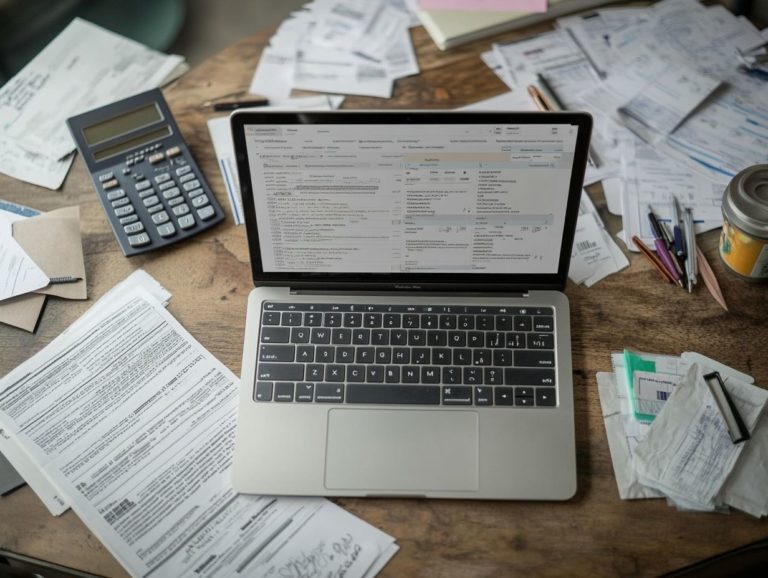Freelancer Tax Deductions: The Complete List
Freelancing provides you with the flexibility and independence you crave. However, it also brings its fair share of financial hurdles, especially concerning taxes related to freelance expenses.
Grasping which expenses you can deduct is essential for maximizing your earnings and minimizing your tax liability. Understanding various tax deductions available for freelancers is key. Let s dive into a list of essential tax deductions that every freelancer should know about, ranging from home office expenses to professional development costs, including educational materials and marketing costs.
You will find valuable tips on tracking expenses and deductions. Additionally, we ll highlight common pitfalls to sidestep, ensuring you re thoroughly prepared come tax season with a solid bookkeeping system.
Explore how to optimize your freelance income and manage your money effectively to make every dollar count!
Contents
- Key Takeaways:
- 1. Home Office Expenses
- 2. Office Supplies and Equipment
- 3. Travel Expenses
- 4. Professional Development and Training
- 5. Health Insurance Premiums
- 6. Advertising and Marketing Expenses
- 7. Subcontractor and Freelancer Fees
- 8. Internet and Phone Expenses
- 9. Bank and Credit Card Fees
- 10. Insurance Premiums
- 11. Business Meals and Entertainment
- 12. Website and Domain Expenses
- 13. Software and Tools
- 14. Legal and Accounting Fees
- 15. Charitable Donations
- What Are the Requirements for Claiming Tax Deductions as a Freelancer?
- Frequently Asked Questions
- What are freelancer tax deductions?
- What is considered a business expense for freelancer tax deductions?
- Can I deduct my home office expenses as a freelancer?
- What other deductions are available for freelancers?
- Do I need to keep records of my expenses for freelancer tax deductions?
- Are there any limitations to freelancer tax deductions?
Key Takeaways:

- Home office expenses can include rent, utilities, and maintenance costs. Keep accurate records to claim these deductions.
- Office supplies and equipment can be deducted if used only for business. Keep receipts to support your claim.
- Travel expenses for business trips are deductible. Maintain receipts and records for these claims.
1. Home Office Expenses
Home office expenses are crucial for managing a successful freelance business. They can significantly influence your profits and tax deductions.
It s vital for you to understand what qualifies as a deductible expense under IRS guidelines. This understanding helps minimize your tax burden while maximizing your business revenue and using the standard deduction provided by the IRS.
This includes essential utility costs, such as electricity and internet, critical for your day-to-day operations and communication expenses for client interactions. You can also deduct a portion of your rent or mortgage payments corresponding to the designated home office space as part of the home office deduction.
Maintenance expenses, including repairs or improvements made specifically for your office area, along with any business insurance, are also eligible for deductions. The home office deduction can lead to substantial savings, but calculating it requires careful consideration of the space used exclusively for business purposes and its integration with your overall tax return.
Many freelancers find software like QuickBooks or Stripe invaluable for accurately tracking these expenses. This ensures you don t miss out on potential deductions when tax season rolls around.
2. Office Supplies and Equipment
Office supplies and equipment are vital business expenses for freelancers. They directly support your daily operations and enhance productivity.
These supplies typically encompass computers, printers, and stationery like pens and notepads. They also include educational materials such as books or online courses from platforms like Udemy or Coursera that foster your professional growth.
By accurately categorizing these expenses in your bookkeeping system, you can efficiently track your spending and pinpoint potential tax deductions to enhance your financial planning. Utilizing software that simplifies the logging of each purchase, like Zoom for client consultations, can provide you with clarity and ensure that nothing slips through the cracks come tax season. This ultimately leads to more precise financial reporting and potential savings.
3. Travel Expenses
Travel expenses are significant costs you incur when meeting clients or attending events. You can deduct these expenses to boost your freelance profits and improve your financial stability.
Types of deductible travel expenses include costs from platforms like Upwork. Transportation costs, such as airfare, train tickets, or mileage for your vehicle, are crucial for reducing taxable income.
You can claim lodging expenses for necessary overnight business stays. Meals during business trips are also deductible, but remember to follow IRS regulations to ensure compliance.
Keep detailed records, including receipts and a log of dates, purposes, and locations for your travels. This diligence will pay off during tax season as you prepare your financial records.
4. Professional Development and Training
Investing in your professional development through online courses is essential for skill enhancement. It qualifies as a deductible freelance expense that can improve your business revenue.
Prioritize continuous learning, including mastering tools like Photoshop and SEO software. This proactive approach keeps you competitive and relevant to your clients.
Platforms like Coursera, Udemy, and LinkedIn Learning offer a wide array of courses tailored to various skill levels. Start exploring courses today and watch your skills grow!
Tracking these educational expenses helps you organize your finances. It also enables you to maximize your deductions come tax season, paving the way for a financially sound career.
5. Health Insurance Premiums
Health insurance premiums are crucial for your freelance expenses. They allow you to take care of your health while unlocking significant tax deductions that can enhance your financial stability.
Deducting these premiums lowers your taxable income, resulting in reduced overall tax liability while improving your financial planning. This not only saves you money but also frees up funds for your business or retirement contributions.
Be mindful of such deductions as you navigate self-employment. This awareness secures immediate health coverage and builds a robust foundation for your long-term savings while ensuring compliance with IRS regulations.
6. Advertising and Marketing Expenses
Advertising and marketing expenses are crucial for your freelance business. They enhance your visibility and help attract new clients.
Using various marketing strategies, like social media advertising on Google and Facebook, can boost your visibility. Focus on specific demographics to customize your campaigns for better engagement.
Keep a close eye on these costs to remain budget-conscious. Evaluating your return on investment is essential for your marketing efforts.
Understanding which strategies yield the best results lets you manage resources wisely. Accurately deducting these expenses lightens your financial load and helps you reinvest in your business growth.
7. Subcontractor and Freelancer Fees

When you hire subcontractors or freelancers, their fees become significant business expenses. These costs are deductible under Internal Revenue Service (IRS) guidelines, allowing you to track expenses effectively.
Mastering the art of engaging subcontractors through platforms like Fiverr or Upwork streamlines operations. It’s vital to identify the various costs associated with hiring, including their rates and any additional costs related to payment processing.
Meticulous record-keeping is non-negotiable. Having detailed invoices and receipts facilitates accurate tax reporting and ensures compliance with IRS regulations.
Fostering positive relationships with subcontractors can lead to smoother collaborations. This ultimately translates to increased profitability for your ventures.
8. Internet and Phone Expenses
Internet and phone expenses are vital communication costs that freelancers regularly encounter. They are significant business expenses eligible for tax deductions reported during tax season.
To determine which portions of these bills qualify for deductions, assess how much of these services are utilized for business purposes versus personal use. Maintaining detailed records of your internet and phone usage is essential.
Utilizing tools like expense tracking software, such as QuickBooks, can simplify this process. A clear overview of necessary deductions reduces the risk of errors that could raise red flags with tax authorities.
9. Bank and Credit Card Fees
Bank and credit card fees for payment processing can easily be overlooked. However, they are valid business expenses that freelancers can deduct.
These fees include transaction charges, monthly maintenance fees, and interest on unpaid balances. If not properly accounted for, they can significantly impact your bottom line.
Track these expenses carefully! Consider using accounting software or spreadsheets for better organization.
Keep receipts and note the purpose of each expense. This helps ensure a smoother process during tax season.
10. Insurance Premiums
Insurance premiums, including business insurance, are essential for freelancers. They act as both a safeguard and a category of expenses that can be deducted from your taxable income.
Understanding the various types of insurance can enhance your business strategy. Here are some common options:
- Liability insurance: This protects you against claims related to injuries or damages.
- Health insurance: Necessary for ensuring you have medical coverage when needed.
- Professional indemnity insurance: Covers legal costs if disputes arise over your services.
Each type provides essential protection and contributes to your financial stability. The premiums you pay can often be deducted as business expenses, helping to reduce your overall tax burden. Channel those savings back into your business now!
11. Business Meals and Entertainment
Business meals and entertainment during client meetings qualify as legitimate business expenses, allowing you to deduct these costs while enhancing your client relationships.
These expenses encompass meals tied to your business engagements and entertainment related to your operations. Keeping organized records is vital note the date, attendees, and business purpose for each event.
Use digital tools or expense-tracking apps to streamline this process. Ensure all your receipts are easily accessible when tax season arrives.
By understanding IRS guidelines, you can seize every opportunity for deductions and benefit your bottom line.
12. Website and Domain Expenses
Maintaining a professional online presence through website and domain expenses is crucial for freelancers. You can confidently classify these costs as deductible business expenses.
Knowing the various types of website expenses is key to effective tax planning. Costs such as domain registration, web hosting, and design services all contribute to your operational expenses.
Don t overlook expenses related to content creation, marketing tools, and e-commerce platforms they belong in this category too.
To maximize these deductions, keep meticulous records of every expense and categorize them systematically. Using apps or software for expense tracking can significantly streamline this process.
13. Software and Tools
Investing in the right software and tools is crucial for your freelance business. The good news is that these expenses often qualify as deductible business costs.
Leverage software options like Adobe Creative Suite for design projects, QuickBooks for financial management, and project management tools such as Trello or Asana to streamline workflows. This can elevate your productivity while managing your resources effectively.
Keeping a close eye on these costs helps you budget efficiently and maximizes your tax deductions at the end of the fiscal year.
Maintain organized records by using dedicated accounting software or spreadsheets. This diligent approach can reduce stress during tax season and enable you to make smarter spending decisions in the future.
14. Legal and Accounting Fees

Legal and accounting fees are essential investments for freelancers. They help maintain compliance and safeguard businesses.
Keep meticulous records! They can significantly reduce your tax bill. By categorizing receipts and invoices related to legal consultations or accounting services, you can ensure that you capture every eligible deduction. For more insights, check out these freelancer tax tips to make the most of your refund.
Given the complexity of tax law, seeking advice from experts who know the rules is crucial, particularly if you find yourself in intricate financial situations. Engaging with these professionals clarifies uncertainties and enables you to navigate potential challenges, ensuring you maximize your deductions while staying within legal boundaries.
15. Charitable Donations
Charitable donations you make as a freelancer not only showcase your commitment to social responsibility but also present valuable tax deductions that can enhance your overall tax situation.
By contributing to qualified organizations, you can effectively reduce your taxable income a particularly advantageous strategy during tax season. Various forms of donations are deductible, including cash gifts, property, and even expenses incurred while volunteering if they meet specific criteria.
To maximize these deductions, maintain meticulous records such as receipts or bank statements that detail each contribution. You will need documentation to verify that the recipient organization is tax-exempt (not required to pay certain taxes).
By grasping what qualifies for deductions and ensuring all necessary paperwork is in order, you can significantly enhance your tax benefits.
What Are the Requirements for Claiming Tax Deductions as a Freelancer?
To effectively claim tax deductions as a freelancer, understanding the IRS requirements is crucial. These guidelines outline what qualifies as valid business expenses that you can deduct from your taxes on freelance income.
Familiarize yourself with the specific categories of deductible expenses, such as office supplies, professional services, and travel-related costs. Organized records are your best friend during tax season! Keeping receipts, invoices, and bank statements establishes a clear trail of expenses required for IRS verification.
Utilizing accounting software can greatly simplify the tracking of these deductions, ensuring that no eligible expense slips through the cracks. It’s wise to consult IRS publications or a tax professional to stay informed about any changes in tax laws that could impact the deductibility of various expenses. For freelancers, referring to the ultimate freelancer tax guide can provide valuable insights.
What Are the Common Mistakes to Avoid When Claiming Tax Deductions?
Claiming tax deductions can be a straightforward process for you, but as a freelancer, it s easy to stumble into common pitfalls that might lead to missed opportunities or even penalties.
Understanding the intricacies of tax laws is essential. Overlooking crucial details could result in significant financial setbacks down the line. Many freelancers neglect to maintain proper documentation for their expenses, making substantiating claims a daunting task. To avoid pitfalls, be aware of freelancer tax deductions you might overlook, as misclassifying expenses could also spell trouble during an audit.
Not fully grasping the IRS guidelines especially since they can change annually leaves you open to avoidable mistakes. To navigate these challenges effectively, implement a reliable record-keeping system, regularly update your financial categories, and stay informed about current tax regulations. Seeking professional advice can be invaluable in ensuring compliance and maximizing your deductions.
Mastering Your Tax Deductions: A Freelancer s Guide!
Keeping track of tax deductions is crucial for freelancers. It helps manage expenses and ensures compliance with IRS regulations.
Explore different methods to find what works best for you! Accounting software like QuickBooks offers features that simplify tracking and categorizing expenses. This makes generating reports easy when tax time rolls around.
Alternatively, maintaining detailed spreadsheets provides a flexible approach to monitor your finances. If you re often on the move, using apps designed for freelancers can turn your smartphone into a powerful financial tool, allowing for effortless expense recording as they occur.
Regardless of the method you choose, maintaining consistency and organization is crucial for achieving financial clarity. This ensures that nothing slips through the cracks when tax season arrives.
What Are Some Lesser-Known Tax Deductions for Freelancers?
Freelancers may find it eye-opening to learn about several lesser-known tax deductions, such as business expenses, which can significantly lower taxable income and enhance financial well-being.
Many freelancers often overlook deductions like legal fees incurred during business formation, which can lead to substantial savings. For more insights, check out these 5 tips for freelancers on tax write-offs. Expenses related to professional memberships for industry-specific organizations can also be deductible and classified under marketing costs.
For example, if you’re a graphic designer who joins a professional association for exclusive resources or networking opportunities, that membership fee can help reduce your taxable income. To maximize your benefits, consider exploring freelancer tax strategies for the self-employed, which can positively impact your freelance profits.
By capitalizing on these unique deductions, freelancers can improve their financial landscape and reinvest in their crafts and businesses. This sets them up for even greater success through effective financial management.
How Can a Freelancer Determine If an Expense Is Tax-Deductible?
Determining if an expense is tax-deductible is essential for freelancers. This significantly influences taxable income and overall financial management.
To qualify as a deductible expense, it must be common in your industry and important for your business, like software subscriptions such as QuickBooks or Adobe Creative Suite. For more insights, check out these 5 key tips for freelance tax deductions.
For instance, if you’re a graphic designer, you can deduct expenses related to software subscriptions like Photoshop and design tools. Similarly, if you’re a freelance writer, you can write off costs associated with research materials, home office supplies, and even online courses that enhance your skills. To learn more about these strategies, check out Maximizing Deductions: A Freelancer’s Guide.
Ensure that every deduction counts! Each one directly impacts your earnings and financial health. It’s important to make sure that each deduction is directly related to your freelance business, reinforcing its connection to the income-generating activities that sustain your livelihood, like client meetings and payment processing.
Frequently Asked Questions

What are freelancer tax deductions?
Freelancer tax deductions are business expenses that can be deducted from a freelancer’s income to reduce their taxable income. These deductions can include business expenses, home office expenses, and other expenses related to running a freelancing business.
What is considered a business expense for freelancer tax deductions?
Business expenses for freelancer tax deductions are any expenses that are necessary and ordinary for running a freelancing business. This can include expenses such as advertising, office supplies, and travel expenses.
Can I deduct my home office expenses as a freelancer?
Yes, freelancers can deduct their home office expenses if they use a designated area of their home regularly and exclusively for business purposes, known as the home office deduction. This can include a portion of rent or mortgage interest, utilities, and other related expenses.
Ready to maximize your deductions? Start tracking your expenses today!
What other deductions are available for freelancers?
Freelancers can claim deductions for retirement contributions, health insurance premiums, and education related to their business. These deductions can significantly lower your taxable income and save you money on taxes.
Do I need to keep records of my expenses for freelancer tax deductions?
Absolutely! Keeping detailed records is crucial for freelancers.
This includes receipts, invoices, and other documents that support your claimed deductions.
Are there any limitations to freelancer tax deductions?
Yes, limitations exist for freelancer tax deductions. For example, home office expenses may have caps, and self-employment tax can only be partially deducted.
Consult a tax professional or check the IRS guidelines for specific limits and options like the IRS standard deduction, which reduces your taxable income.






